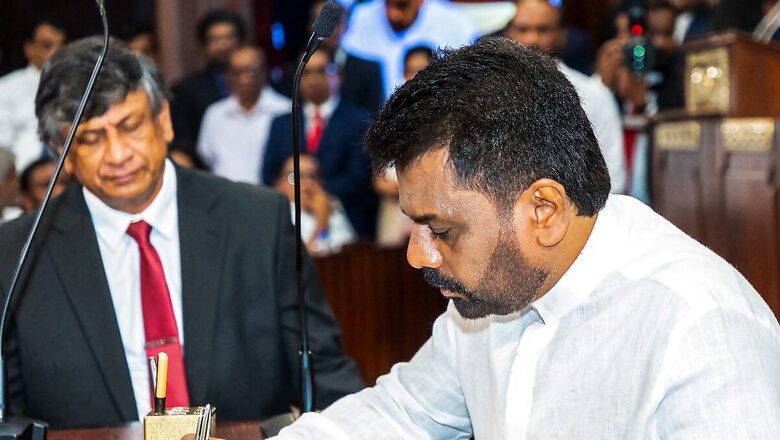
views
As Anura Kumara Dissanayake takes over as the President of Sri Lanka, India faces a pivotal moment in its relations with its southern neighbour. Dissanayake, a Marxist, will lead a nation fraught with economic instability and a population desperate for change. His government’s handling of the IMF bailout and broader economic reforms will directly affect not just Sri Lanka’s future but also regional stability, with serious implications for India’s interests in the region. New Delhi will need to carefully monitor his policies to safeguard its investments and economic ties.
A major challenge for India will be the evolving geopolitical dynamics in the Indian Ocean. Sri Lanka’s strategic location has long placed it at the focal point of the competition between India and China. Under Dissanayake, Colombo may tilt further towards China, emboldening Beijing’s influence in the region. India will need to bolster its diplomatic engagement to counterbalance this potential shift and protect its strategic interests.
The unresolved grievances of Sri Lanka’s Tamil community add another layer of concern. With a large Tamil population in India, New Delhi has a stake in ensuring their rights and dignity are upheld. How Dissanayake addresses this sensitive issue will shape India’s response, demanding careful diplomatic handling.
Moreover, Dissanayake’s past as a Marxist and his present political ideology could alter Sri Lanka’s internal security landscape. Any rise in militancy or instability could have direct consequences for India’s own regional security interests. In essence, Dissanayake’s presidency presents India with a complex mix of challenges across economics, geopolitics, and security, requiring a calibrated and forward-looking approach.
Geopolitical Challenge
As Dissanayake assumes the presidency of Sri Lanka, India faces a challenge. His rise, rooted in Marxist ideology and historical proximity to China, brings a new dimension to India’s already complex regional relations. His ascent signals a potential shift in Sri Lanka’s foreign policy that could deepen China’s influence in the Indian Ocean, a region critical to India’s strategic and economic interests. Historically, Dissanayake has expressed anti-India sentiments, and this past, combined with his inclination towards China, adds to India’s concerns.
Simultaneously, India’s other neighbour, Bangladesh, is grappling with political unrest. The rise of anti-India and anti-Hindu factions, such as the Jamaat-e-Islami, poses a direct threat to India’s influence in the region. This political instability in Bangladesh could further embolden anti-India forces, weakening the traditionally friendly ties between the two nations. In addition, India’s relationship with Pakistan remains fraught with challenges, ranging from border tensions to diplomatic confrontations, creating a geopolitical conundrum on multiple fronts.
In this context, Dissanayake’s presidency in Sri Lanka only compounds India’s concerns. This may further lead to the encircling of India within a growing sphere of Chinese influence in South Asia. China’s Belt and Road Initiative (BRI) projects in Sri Lanka, especially infrastructure developments like the Hambantota port, have already raised alarms in New Delhi regarding China’s expanding foothold in the Indian Ocean.
For India, managing these simultaneous regional challenges will require deft diplomacy. Balancing relations with Sri Lanka, Bangladesh, and Pakistan while countering China’s strategic advances demands a renewed focus on South Asia. As these nations navigate their internal political turmoil, India must act decisively to preserve its influence and safeguard its interests in the region. Dissanayake’s presidency is a test of India’s geopolitical agility in an increasingly complex neighbourhood.
Navigating Economic Uncertainty
Dissanayake’s presidency ushers in a transformative phase for Sri Lanka, a nation grappling with one of its worst economic crises. Known for his Marxist leanings, Dissanayake has pledged to renegotiate the terms of Sri Lanka’s International Monetary Fund (IMF) bailout, aiming to ease the burden on the working class. While his promises resonate with a populace exhausted by austerity, these moves introduce a level of economic unpredictability that could reverberate across the region.
India, having extended nearly $4 billion in financial aid to Sri Lanka during the crisis, now faces a complex diplomatic challenge. This assistance, which included currency swaps, credit lines, and deferred loans, was instrumental in preventing Sri Lanka’s financial collapse. However, with Dissanayake potentially reconfiguring the nation’s economic trajectory, India must act cautiously to secure its investments and ensure regional stability.
Any renegotiation of the IMF deal could recalibrate Sri Lanka’s debt policies, potentially altering public spending and repayment schedules. For India, this means vigilant diplomacy to protect its economic interests and prevent broader instability that could disrupt regional trade and cooperation.
Additionally, India’s strategic concerns in Sri Lanka go beyond economics. With China’s growing influence in the region, India’s aid was partly aimed at countering Beijing’s sway. Dissanayake’s leadership could shift this delicate balance, making it critical for India to engage diplomatically.
In sum, Dissanayake’s presidency presents both challenges and opportunities for India. A nuanced approach will be essential to supporting Sri Lanka’s recovery while safeguarding India’s strategic and economic foothold.
Advocating for Sri Lanka’s Tamils Under Dissanayake
The Tamil community in Sri Lanka has faced decades of marginalisation and conflict, leading to deep-rooted grievances that require urgent attention. Anura’s presidency offers a unique opportunity to address these longstanding issues. His government’s approach, however, could either bring much-needed relief or further exacerbate the challenges.
Dissanayake’s administration holds the potential to introduce policies aimed at inclusivity and justice for the Tamil population. His leftist ideology hints at a shift towards more equitable resource distribution and greater political representation for minorities. However, there are concerns that Tamil issues may not be a priority, given the broader economic and political crises confronting Sri Lanka.
India, with its sizable Tamil population, has a direct interest in the well-being of Tamils in Sri Lanka. The historical and cultural ties between the Tamils of both nations compel New Delhi to take a proactive role. India must engage diplomatically with Dissanayake’s government to advocate for the rights of the Tamil community. This includes urging for the full implementation of the 13th Amendment, which promises greater autonomy and devolution of power to Tamil-majority regions.
While Dissanayake’s presidency brings the possibility of change, it demands vigilant and sustained efforts from India to ensure the Tamil community’s grievances are addressed and their rights safeguarded.
Ensuring Stability
Dissanayake’s election as Sri Lanka’s president brings both opportunities and challenges for regional security, particularly for India. With a history rooted in the Janatha Vimukthi Peramuna (JVP), a group known for its violent insurrections, there are concerns over how Dissanayake’s administration will handle internal security. His government could either alleviate economic and social grievances or exacerbate tensions, leading to potential instability within the region.
For India, this political shift necessitates vigilance. Sri Lanka’s internal security policies under Dissanayake could influence regional dynamics, and any increase in militancy might spill over into Indian borders.
India’s response should include strengthening intelligence and security cooperation with Sri Lanka, alongside proactive diplomatic engagement to ensure that peace is maintained.
The challenge for India lies in balancing support for Sri Lanka’s economic recovery while safeguarding its own strategic interests. Maintaining a close watch on internal developments and engaging in constructive dialogue will be critical in mitigating potential security risks.
In conclusion, while Dissanayake’s presidency may reshape Sri Lanka’s internal policies, India’s careful approach will be essential to preserve regional stability and prevent security threats.
The author, a columnist and research scholar, teaches journalism at St. Xavier’s College (autonomous), Kolkata. He tweets at @sayantan_gh. Views expressed in the above piece are personal and solely those of the author. They do not necessarily reflect News18’s views.

















Comments
0 comment